The Cruising Clan (or Why Can’t We All Just Be Nice To Each Other?)
In which the Admiral muses on friendship, world peace, and on the wholesome nature of the drunken sailor.
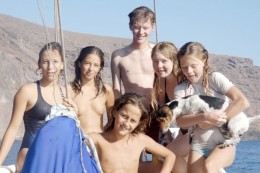 Cruising people often comment on their children’s friendships, which are frequently very intense. The kids don’t often get the chance to socialise with their peers, and when they do there is no hanging about; they just dive straight in and play together as if they were bosom buddies.
Cruising people often comment on their children’s friendships, which are frequently very intense. The kids don’t often get the chance to socialise with their peers, and when they do there is no hanging about; they just dive straight in and play together as if they were bosom buddies.
What the parents of these children don’t seem to have noticed is that their own relationships are often very similar. Cruising adults, too, are apt to become heavily embroiled with others of the International Cruising Clan. The reason for this is very simple: whatever our age, we all realise that in just a few days or weeks we will disappear out of each other’s lives again – possibly forever.
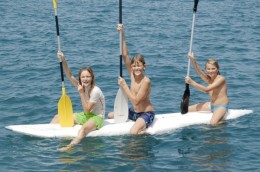 Perhaps, if we got to know each other better, we might find that this lovely French man, with his perpetual smile, or his clever wife, with her infectious giggle, are not really soulmates. Perhaps we might find that we have nothing in common… but I don’t think so.
Perhaps, if we got to know each other better, we might find that this lovely French man, with his perpetual smile, or his clever wife, with her infectious giggle, are not really soulmates. Perhaps we might find that we have nothing in common… but I don’t think so.
Over the course of a half-dozen evenings and several dozen bottles of wine we compare notes; we swap stories about storms and anchorages, and then, having quickly estblished a deep affection and absolute trust, we peel back our masks and pour out our views on the heavy duty stuff – on ecological issues, and on those perennial classics: racism, politics, religion, and how-often-do-you-shower?
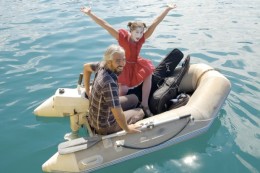 Finding that our opinions match, like cards in a game of snap, we realise, with delight, that we are all of one creed. Nationhood is promptly abolished and buried, to the extent that one soon forgets whether one’s companions are from the same land mass. Be they French, German, Belgian, Polish, Canadian, Turkish, or Norweigan, these yotties are all just like us.
Finding that our opinions match, like cards in a game of snap, we realise, with delight, that we are all of one creed. Nationhood is promptly abolished and buried, to the extent that one soon forgets whether one’s companions are from the same land mass. Be they French, German, Belgian, Polish, Canadian, Turkish, or Norweigan, these yotties are all just like us.
Even religious and cultural differences are of no concern, for we all seem to abide by the same code of ethics, and we easily adapt to the mannerisms which betray occasional diferences in socially acceptable behavior. (Dinner etiquette is the eye-opener here. Some folks, for example, see nothing wrong in sitting down to a meal which their visitors are not sharing, whilst others, at the other end of the scale, are not accustomed to eating with their guests and would prefer to sit and watch.)
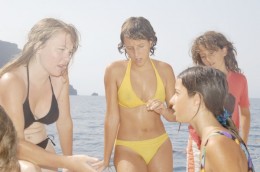 Most of us find these differences interesting rather than offensive, and we adjust our behaviour accordingly, until soon it becomes clear that language is the only vestige of our separate origins.
Most of us find these differences interesting rather than offensive, and we adjust our behaviour accordingly, until soon it becomes clear that language is the only vestige of our separate origins.
And we know, for sure, that together we could put the whole world to rights, if only the rest of you would only join hands and hearts in the same way.
Of course, it could be that travellers are very different from stay-at-homes.
Over the years I have had plenty of opportunity to consider these relationships, and I have come to the conclusion that the key features are the distance from the homeland and the instant acceptance of the other fellow.
People who are at home, in their own countries, already have their own social set. Unless they are bored with this company they don’t tend to notice the comings and goings of itinerant strangers. When they do find themselves mixing with foreigners, they expect the new arrival to conform to the prevailing moral and social code. However much we may enjoy exotic foreign foods and other cultural elements – such as curry, yoga, yoghurt, and Arabian drums – we don’t wish for any other culture to ride rough-shod over our own. “When in England, do as the English.”
But travellers are friendless souls and, as such, tend to have an open-hearted attitude towards their friendless, travelling kin. The locals may not be very accepting of us, but other travellers always will.
Meanwhile, people who are living in one spot don’t tend to open their doors wide to the new kid in town; they don’t invite him into their home for drinks just because he happens to be strolling past.
There is probably good reason for this. One might invite the stranger in, only to discover that he is a facist-minded slob with an obsession for Tequila and train-spotting.
When the guy on the boat next door rows past, one knows immediately that he is a fellow-yotty and a fellow-traveller. It is most unlikely that he will turn out to be a facist dope-fiend. And if he does, well, at least we won’t have to share the same neighbourhood for very long. One or other of us will soon be moving on.
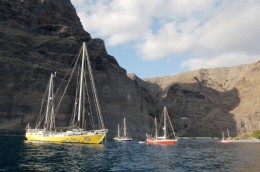 Our recent companions have mostly been mostly French, and – Oh, boy! – do they know how to party! Our first session saw fifteen of us crammed around a table in one small cabin, with empty wine bottles making it hard to find a place to set one’s glass. A couple of the chaps had guitars. One was actually a professional musician, and the other had the kind of voice which could certainly earn him his living, too – if he weren’t more interested in earning it as a float-plane pilot. The rest of us helped them out with yelps, howls, and claps, and with drumming (on the table) and a clatter of spoons (from the cutlery drawer) and maracas (improvised from empty beer cans filled with olive stones).
Our recent companions have mostly been mostly French, and – Oh, boy! – do they know how to party! Our first session saw fifteen of us crammed around a table in one small cabin, with empty wine bottles making it hard to find a place to set one’s glass. A couple of the chaps had guitars. One was actually a professional musician, and the other had the kind of voice which could certainly earn him his living, too – if he weren’t more interested in earning it as a float-plane pilot. The rest of us helped them out with yelps, howls, and claps, and with drumming (on the table) and a clatter of spoons (from the cutlery drawer) and maracas (improvised from empty beer cans filled with olive stones).
At five in the morning the Mollymawks tried to slink away, but they accused us of not being able to take the pace.
After a fortnight of almost constant partying the little gang began to dissolve as we headed off, each in pursuit of his own dream. We held a farewell do aboard Mollymawk. By this time our ranks had been swollen, so that there were twenty-two people to feed and water and seat – but we managed it!
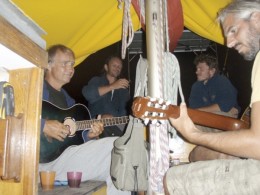 Now, the little society has broken up – like seeds from one pod; or like a raft of shearwaters dispersing over the ocean – and for a little while we will feel lonely. But the Cruising Clan is huge, and there is always another friend just around the corner, in the next anchorage.
Now, the little society has broken up – like seeds from one pod; or like a raft of shearwaters dispersing over the ocean – and for a little while we will feel lonely. But the Cruising Clan is huge, and there is always another friend just around the corner, in the next anchorage.
In the old days we used to feel sad when we moved on, but now we can keep in touch via the internet. That invention has certainly changed the life of the cruising yotty. Now, we can be sure that Gigi and Marie reached Cabo Verde safely, and we can even arrange to meet up with people again. Before, when we said “Bon Voyage”, we were saying adios for good.
“If only we had e-mail addresses for some of the folks we met in the past! I wonder what happened to that young French couple that we met in Sal? Do you remember? We found their boat, two years later, wrecked on the rocks in Ilha Trindade. I wonder what they’re doing now….
And do you remember those parties we had the first time we sailed to Tenerife? We were singing all night. And George played his squeeze box, and one of the Bulgarian lads played his guitar. And the American couple had a pussy cat, and it peed on our bed!”
“Yes… I wonder where they are now.”
Well, as they say, it’s a small world.
 Yesterday we had a phone call. Someone had left a puppy aboard a boat in the anchorage, in Las Palmas, and after twenty four hours of listening to its piteous cries I had left a message with a local rescue centre. To our surprise it was an American who called back. Without even mentioning the puppy he asked, “Were you ever in Tenerife?”
Yesterday we had a phone call. Someone had left a puppy aboard a boat in the anchorage, in Las Palmas, and after twenty four hours of listening to its piteous cries I had left a message with a local rescue centre. To our surprise it was an American who called back. Without even mentioning the puppy he asked, “Were you ever in Tenerife?”
“Yes… But….?”
“I thought I knew the name. It was 20 years ago, wasn’t it? You must remember us, I’m sure. Our cat peed on your bed.”
What with cut-price air travel, television, and the internet, it really is a very small world that we live in nowadays. And we’re getting to be a very big family, leaning hard on the seams and getting under each other’s feet.
So let’s all try to do a better job of playing nicely together!
